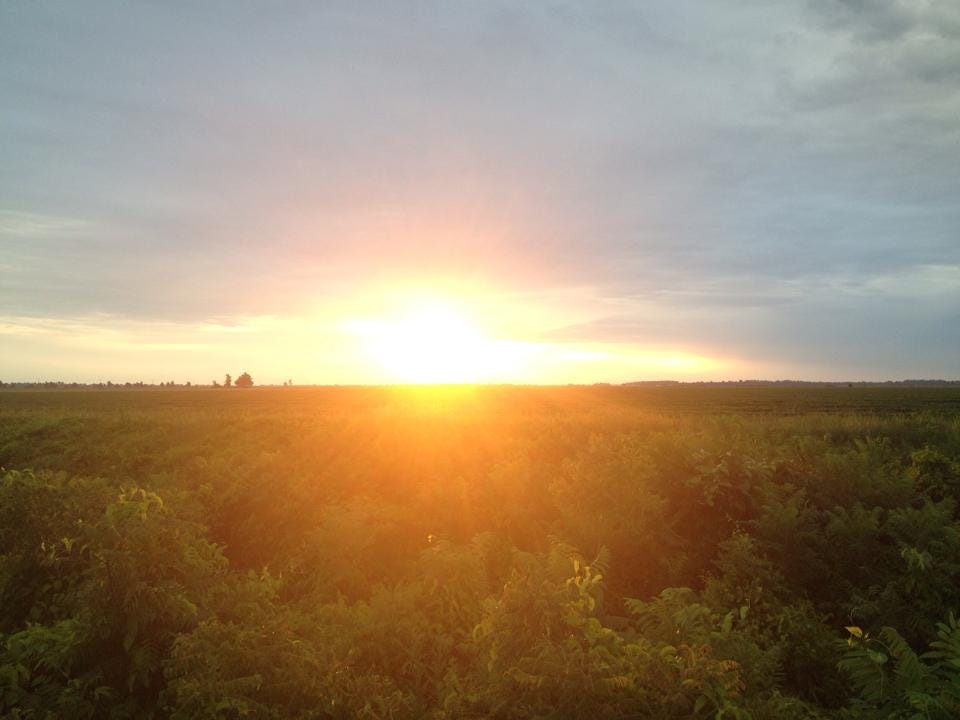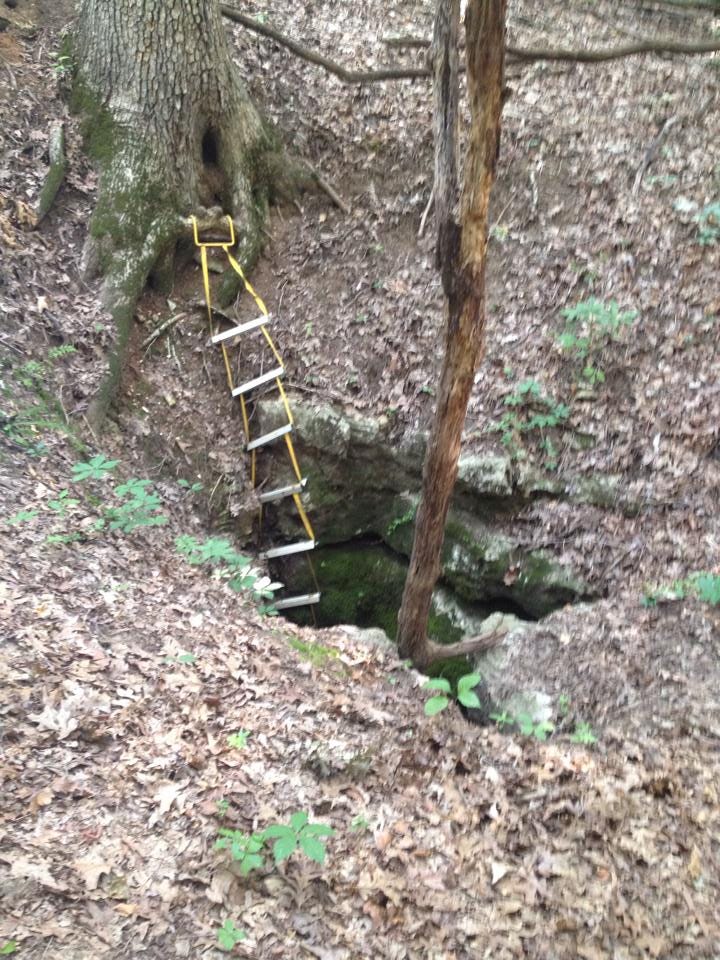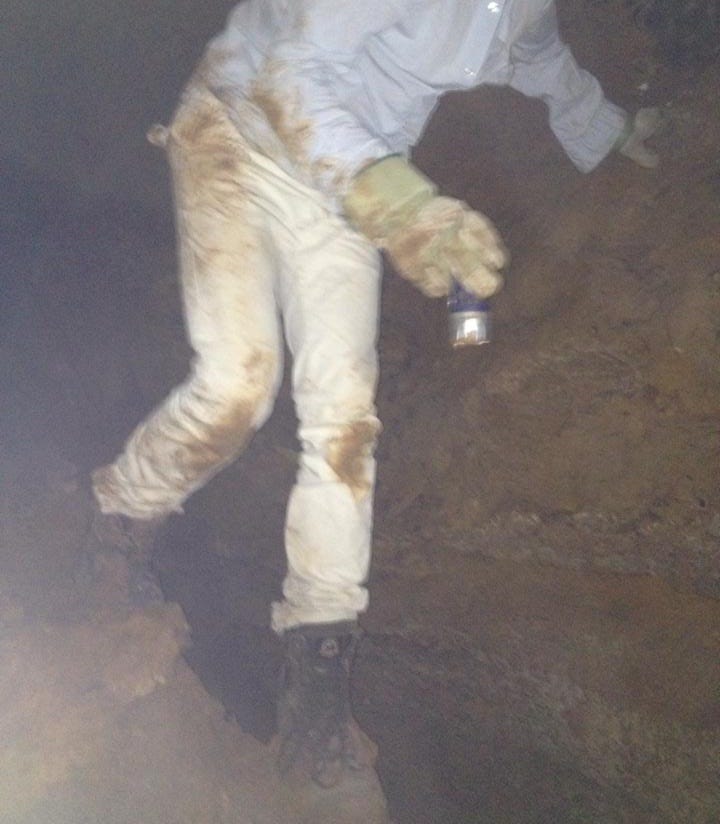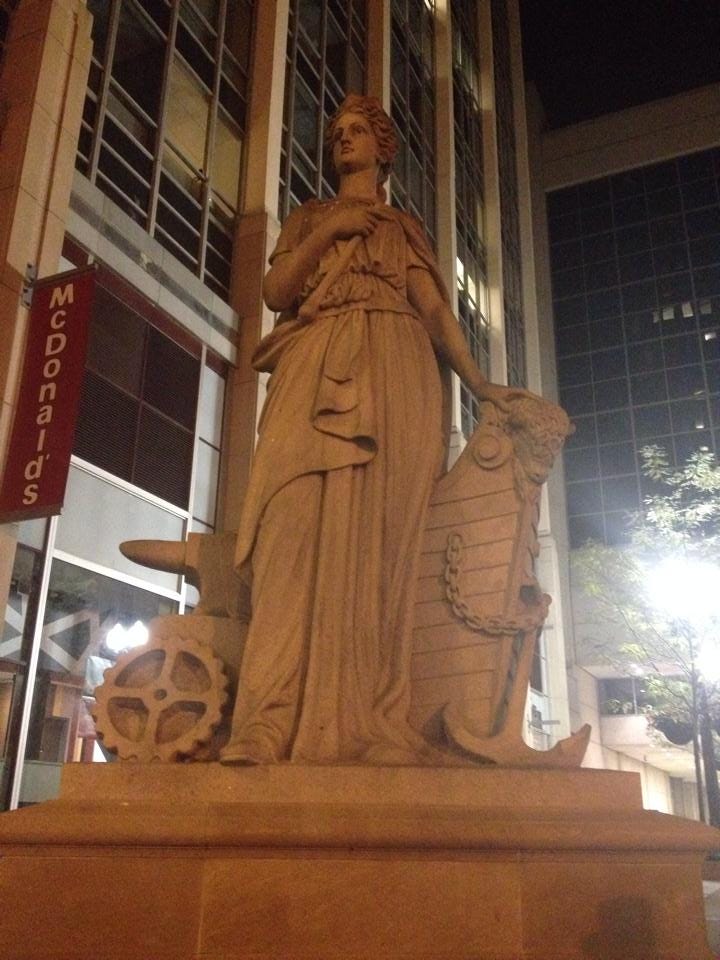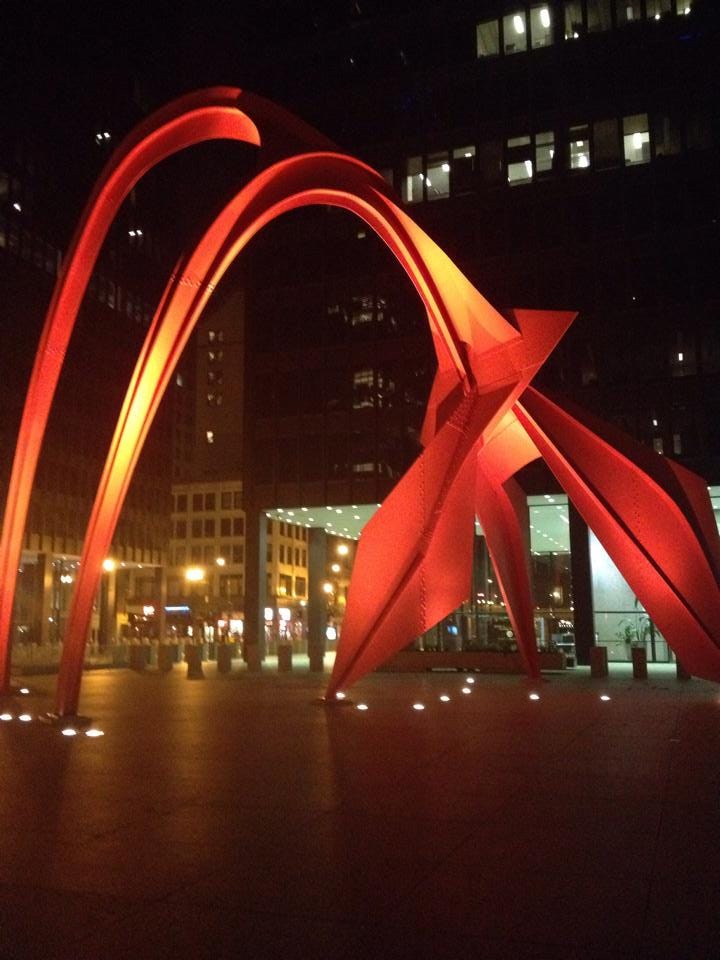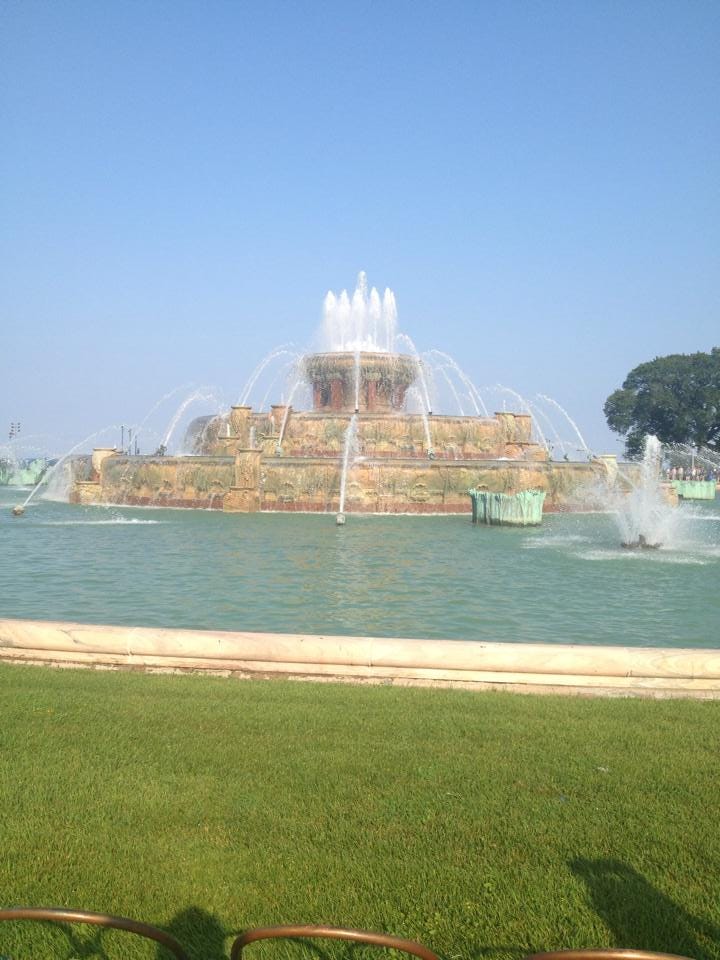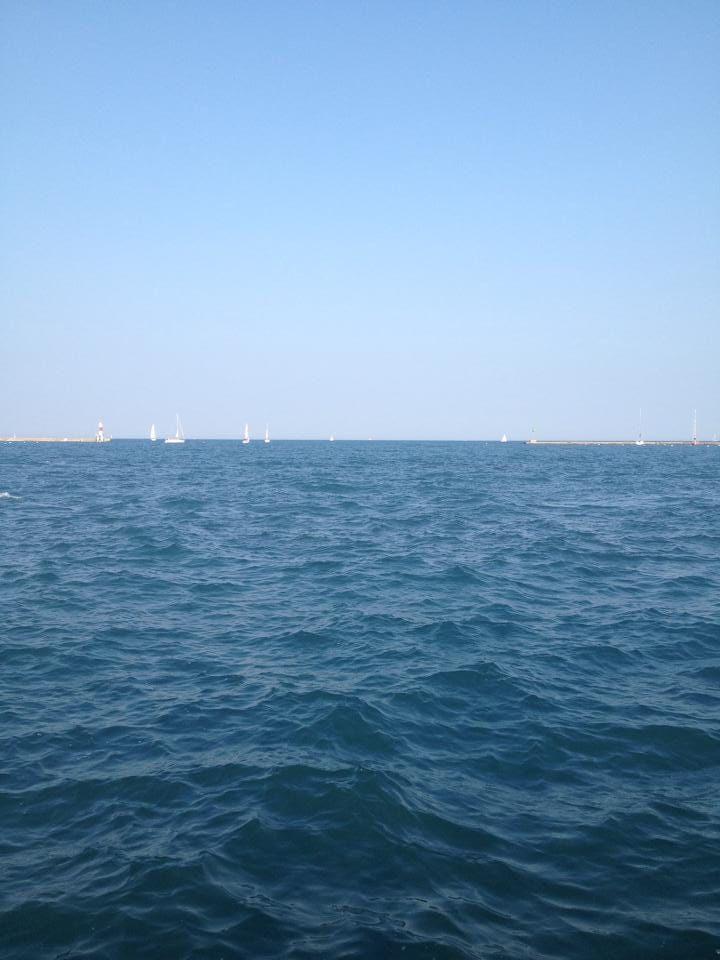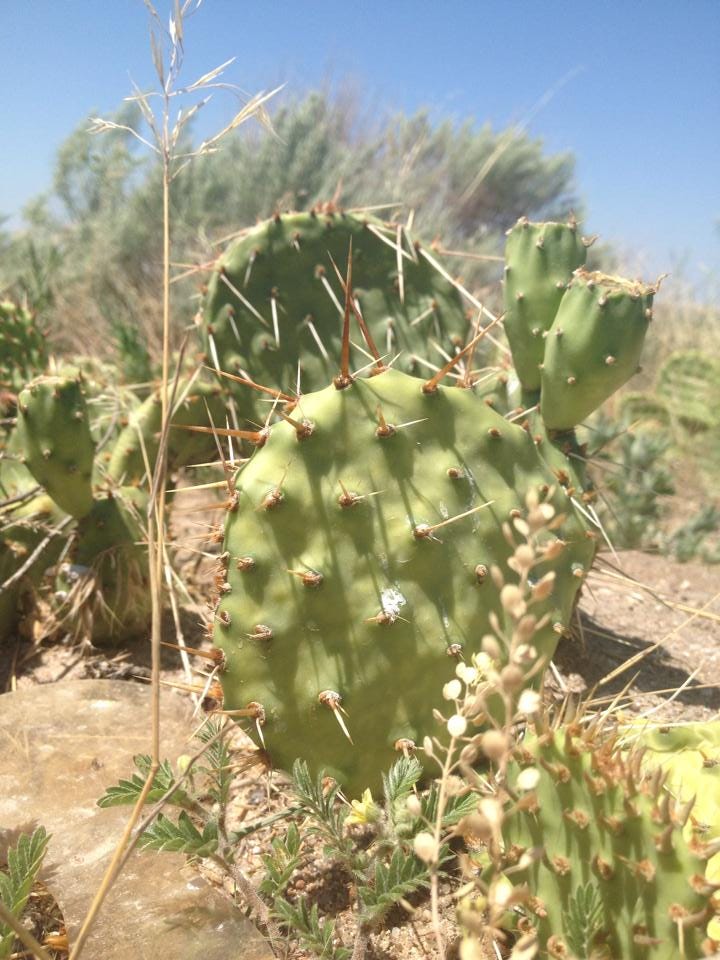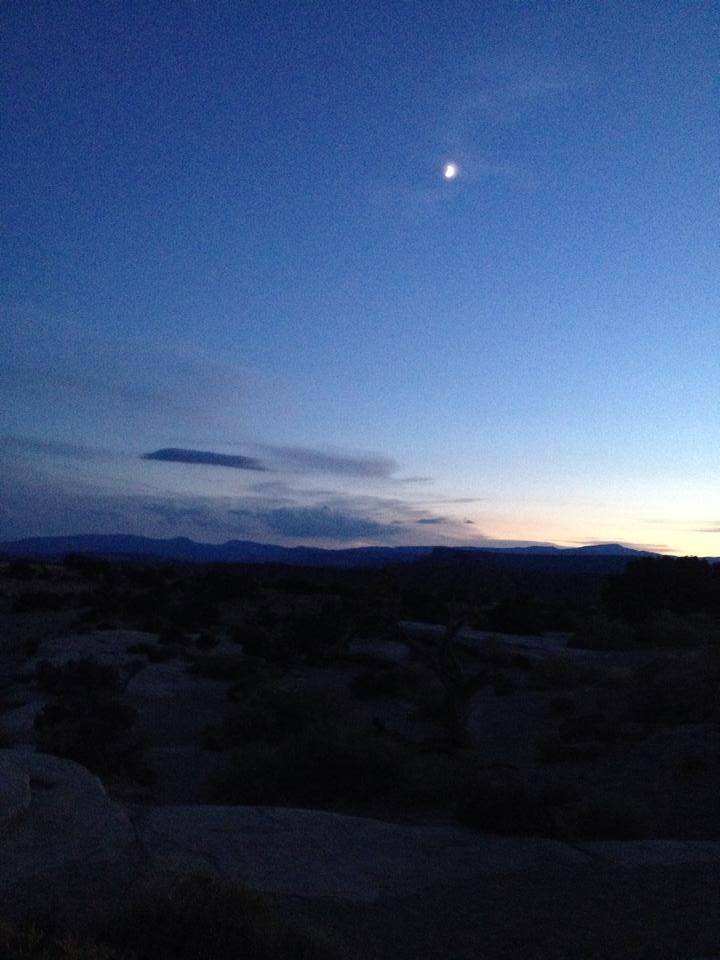How dull it is to pause, to make an end,
To rust unburnish'd, not to shine in use!
As tho' to breathe were life! Life piled on life
Were all too little, and of one to me
Little remains: but every hour is saved
From that eternal silence, something more,
A bringer of new things; and vile it were
For some three suns to store and hoard myself,
And this gray spirit yearning in desire
To follow knowledge like a sinking star,
Beyond the utmost bound of human thought.
—Tennyson, “Ulysses”
[This is part of a serialized novel called The Strands. Click here for chapter one]
I passed a cop car idling, lights off and unmarked, sleeping in the grassy median of Route 80 somewhere in Mississippi while flying northward at dusk. My foot settled the car down into a trot, my tingling nerves racing, half empty liquor bottles rolling on the passenger floor. “Ah well, it’s been fun.” But when the cop began to ride us, bearing his tinted windows and all-black exterior, he didn’t flash his lights. He gradually let himself be enveloped by the traffic and the dark-blue fog. We thought we were fine. Then he came speeding up the left lane, flooring past us, riding 100 yards ahead and then braking. Now we were riding him; after a minute of this he just blinkered off, let us pass him, and jumped behind us again. He’s just fucking with us now: I raised from 55 up to 68, remaining within the range of acceptability but going fast enough to get rid of the fucker. Gradually, like a bored bear, he drove off.
Maybe 10 hours later I was starting the car after pulling off a Missouri highway. Sometime after midnight we had pulled into Memphis, a mere shell of what it had been. Mostly everything was closed on the main strip and the rest of it was big installations that bore none of its blues roots. Perhaps we had gotten there too late, but either way the parties evidently end early. Six African-American gentlemen surrounded the Mercedes as we emerged from it and immediately offered us various drugs. We declined and walked along the pier slowly, gazing into the Mississippi, discussing the fall of blues and the rise of Kanye, wondering where we should go next. “St. Louis is cool,” I said. “I have cousins there.” I checked the time. “Well, it’s 2:00 AM now; I’ll call them when they wake up.” So now it was 5:00 AM and I hadn’t stopped; I had pulled over to take a picture of the sunrise, which poured itself like lava over a cornfield somewhere in the Ozarks.
Then it was about 7:00 AM and I was repeatedly dozing off, swerving, and then sharply pulling myself awake as I heard the divots in the median rumble. My cousin Windom answered the phone: “Hullo?” I doubted he still had my number; I had to get his from Facebook, scrolling on his info section as I was cutting in between cars. “Winny, it’s Finn. I’m about hour from St. Louis, on a road trip, was wondering if you’re around.” There was a pause, then he started laughing. “You crazy mothurfuckur. Yeah, I’m aroun’. I mean, I’m workin’, but I’ll be off for lunch ‘round twelve. You can stop by mah apartment. Wayne’s there, he ain’t workin’, lazy bum!”
Windom and Wayne were the perfect picture of older and younger brother: Windom always setting the trends, deciding what activity they’d take up—video games, skateboarding, snowboarding, playing instruments, building vast social lives—but Wayne always besting him, rivaling his elder with the ferocity of a rebel. But Windom found somewhere Wayne couldn’t follow him when he threw aside all his pop culture in favor of hard work. He began by mowing lawns of ballfields for a summer, found more work through his boss, and slowly started adopting the traits of his crews: first the accent and the clothes and the music, and then the blue-collar skill. He was midway through his twenties now and had decently submerged himself in the west to the point where his Jersey roots were soundly buried, almost untraceable except for his Italian dark eyebrows on his otherwise red head.
I called Wayne, who indeed was still asleep, but by the time we got to their condo—one unit of a dozen all connected as one building, and there were five of these vinyl-sided buildings with parking lots running parallel—Windom had gotten Wayne up and he was there yelling to us from the third story balcony, with a joint in one hand a bowl of cereal in the other. We parked right under Wayne’s waving arm in the visitor spot and climbed the staircase to meet him.
An AR-15 casually sat on the countertop, along with grinders and little specks of weed littering the white faux-marble. On the coffee table were handguns and bullets strewn haphazardly, right beneath flowerpots their mom bought as housewarming gifts. “Yah, what can you do, Winny’s ridiculous,” Wayne said. “Thinks he’s all country now. Poser.” Wayne started coming up with things to do, like hit the skatepark or daydrink at his friend’s apartment in St. Louis, but all I could think about were roadsigns, which flooded at me as I rested on his couch and slid into sleep.
When I awoke, Windom was home and I joined him on the balcony. Alexandre and Wayne, also waking up from naps, followed. “So how’d you guys meet?” he asked us. I began to give the long version, but Alexandre cut it short: “We started talkin’ on 4chan, popped some molly een Québec, and now we’re here.” They laughed. “Fuckin’ love it!”
Wayne put on Fear and Loathing in Las Vegas. We watched it in a trance-like state, an ode to our trip and a portent of what was to come. Windom brought out more of his guns; I picked one up, swinging it to my sight as Alexandre happened to pass by. “Ay wat de fuck! You could’ve kill mee!” Wayne got a text from one of his old skater friends who was now a farmer, inviting us to his bonfire for some hot dogs and beers. Wayne drove us in his truck through old country roads, listening to midwestern screamo, reminiscing about when we went to Warped Tour together in middle school. “Remember Windom’s friend Leo?” I asked, “That guy was funny. Alexandre, he was this tall lanky hippie Venezuelan guy, looking like Geroge Harrison with his mane, super spaced out as if he was always on acid, always cracking jokes, who hung out with us for like a week and a half when my family visited them back in like 2006.” I thought about his dozens of stories of hooking up with girls, wearing his studded belt and skinny jeans, blood on himself from jumping fences and fighting in brawls at parties, getting into trouble every day. Wayne brought up the time they pretended the cops were after them and had us hide at 3 o’clock in the morning. “Whatever happened to him?” “I think he’s in rehab now. He got hooked on coke, now he’s all born again because his mom’s all about that shit.” I remembered how he had shown me LA Woman for the first time, along with M.I.A. and 3OH!3, and how my dad and him bonded over Grateful Dead’s American Beauty. Leo, Windom, and Wayne were the first people I met who had Facebooks; I remember how they and their friends would have parties, always at each other’s mcmansions in the St. Louis suburbs, and upload 100s of pictures each time. Somehow they always seemed to learn of trends faster than we on the east coast did: South Park, Halo, iPods, Lil Wayne, YouTube, MySpace. But maybe it made sense—as the St. Louis Arch was the gateway to the west, it was also the passageway of Hollywood to the staid and conservative east.
There was something wholly different about life out here, unlike the sports-dominated hierarchies back home and the ubiquitous fear toward male fashion, especially metalcore fashion; although kids in the older grades wore it, and I did, and received ridicule from “friends” for it. There was less stiltedness here. Or maybe there was just the same amount, and kids like Windom and Leo would just choose to start fights over it. But then again, I did that too, and it didn’t end up in my favor; only when I reconciled with their beer-chugging, shorts-wearing, salesmen-futures did I fit in, for that short time at the end of middle school and early high school, before I threw all that away to read books about the big bang and our origins as apes, in order to argue with my peers better about atheism, until I learned how to win arguments and then, in my solitude, sent myself fully reeling into the abyss of terror that was planted in me like a seed ever since my dad told me about the death of God when I was eight. All this I talked to Alexandre about as we waited for Wayne to pick up a 12-pack halfway to his friend’s house. He listened attentively and with concern, noting it, interjecting only to ask pertinent questions, bookmarking the discussion for when we’d have more time as we watched Wayne walk across the parking lot toward the truck.
It was a decent-sized crowd when we got there and as we ate the crowd thinned to just a handful of stragglers, only the close friends. By that time it was dark and the fire was a giant engulfing circle, just absolutely blazing with so much cardboard and wood and random debris. We were seated around this beast and surrounding us, about 10 yards back, were rows of corn stretching in every direction. Directly behind us was a dirt path that snaked up a hill to their house which rested under a bunch of big trees, tire swings under them and pickup trucks parked all over the grass. For hours we talked about life and the universe, Alexandre and I entertaining them with stories and theories, by turns cracking them up and leaving them silent. I cannot remember what was discussed, only that it covered everything, from pop music and celebrity news to the theory of infinite universes and the big crunch.
They liked us enough that the next day they invited us, without Wayne, who had a job interview, to come explore a cave they had found in the woods. They picked us up early in the morning. Practicing hair of the dog, we worked our way through a 12-pack on the ride over. With buzz cuts, sunglasses, and cowboy boots they went paratrooping down a chasm with a rope tied to a tree and around their waists.
We followed them in and immediately discovered the shell of a dead turtle and another two still alive. “Dude holy shit, we gotta save these guys,” one of them said. “On our way back out I’m taking them with us.” After passing through the narrow passageway the ceiling opened up into a massive cavern, sounds of bats chirping, dark as night; one of them lit a flashlight to reveal stalactites dripping into pools on smooth stone floor.
We climbed all the way down into one ravine, went into another passageway, and army crawled until it got too sketchy: the ceiling and the floor were about to sandwich us in. “Ay, fuck dhis shiet! I’m not getting stuck, dat’s fuckeeng terrifaiying,” Alexandre yelled, his accent reverberating off the cave walls. “Yooo, this guy’s hilarrriuus, nah but I agree whichu mahnn, we ain’t goin’ no farther.” We climbed back the other way and went around a spiral staircase formed by the earth mother herself, which led to a nook-spire in the uppermost corner. With the flashlight we could see scrawlings on the walls; the typical “billybob was here,” or two initials with hearts, but some had dates: ’91, ’82, ’74, ’59… we kept reading until we discovered a few dated to the Civil War. “Holy fucking shitttt, that’s fucking aweeesome bro.” Soldiers camped out, maybe on scouting missions, holed up in here with their rifles, carving with bayonet or bowie knife… or maybe it was teenagers messing with people, but I prefer to believe. The prose of the notes was too stately.
The spelunkers, turtles in hand, dropped us at the condo. We could already hear the music from outside. Wayne’s band Joseph Biden and the Robinettes were practicing their psychedelic jams, shaking the walls. “What’s up guys! Sorry can’t hear you!” Wayne took a long hit of a bong and continued to drag his hands Iommi-like on his guitar. “And just when you think you’re out of town, Miser-ree pulls you back in….” The kids there refer to Missouri as “Mis-er-y;” Wayne had previously told us about his plan to move to Williamsburg, Brooklyn, the last refuge of all millennial stupor. I tried to talk him out of it. In between sets he informed us he was accepted at his interview for a pizza delivery position. Just then I recognized that LEO was playing the drums. “Dude, what’s up man! How have you been!” “Duuuude… Fiiiinn… I feel like I’m time travelin’ right now, mannnn.” Wayne whispered that he occasionally gets let out of rehab, and the other guys had brought him along—but that Windom and him weren’t on good terms. Just then Windom pulled in the driveway, at 4 P.M. sharp, after a long day of posting Instagram videos of his job site. “What da fuck’s goin on in ‘ere?!” he yelled up the stairs. Wayne shot back: “Windom, I tol you, band practice is on every Wednesday, Friday, Saturday, and sometimes Mondays and Tuesdays!” “Get da fuck outta here… is that Leo? You goddam—” All of a sudden they started wrestling, drumsticks and measuring tapes flying everywhere. Wayne broke it up and then started fighting with Windom himself. We jumped in, stopping the killing of Abel, and when a momentary calm came over as Leo and the Robinettes drove off in a gaseous plume we decided we’d say our goodbyes.
***
The future’s uncertain and the end is always near. Alexandre asked if any /mu/tants wanted to meet up in Chicago and received a single reply: “get the fuck out of my state.” “Mayn, fuck dese guys,” he said. “Done with dhis website.” He put his tablet down. “So, Finn, you were sayeeng, about atheeism. I was tdhinkin about eet and… waell, Neech, or as you say, and properly, Neecha, said eet best. Yes, as I’ve said, I’ve been reading heem again, dhe ones you recommended—” he reached for a book “—'Let us beware of thinking that the world is a living being. Where should it expand? On what should it feed? How could it grow and multiply?’ … Let me skip some shiet… ‘Let us beware of positing generally and everywhere anything as elegant as the cyclical movements of our neighboring stars; even a glance into the Milky Way raises doubts whether there are not far coarser and more contradictory movements there, as well as stars with eternally linear paths’ … skippeeng all dat… ‘Let us beware of saying that death is opposed to life. The living is merely a type of what is dead, and a very rare type.’ ... ‘But when shall we ever be done with our caution and care? When will all these shadows of God cease to darken our minds? When will we complete our de-deification of nature? When may we begin to “naturalize” humanity in terms of a pure, newly discovered, newly redeemed nature?’” In relation to what you were sayeeng, I was thinking dhis “abyss” you mention, ees but dhe aftereffect of all dhese logical errors we still maek when we consider nature even scientifically… our atheeism ess a Christianeesm, as I’ve always sed, and we haven’t become atheistic enough.”
“Yes, yes, this is classic Nietzsche. But the question is our response to this epiphany… Nietzsche wants the response to be one of enthusiasm, because he believes that all the world-weariness of cosmic pessimism is due to the undestroyed scaffolding of the afterlife… which if exploded would release us from the weight of the question mark that there could be something other than life, and life would them be revealed as the elixir of energy a thousandfold, infinite-fold.”
“Indeed.”
“But, Nietzsche himself did not escape the trap of constantly talking about this realization… insofar as we are still talking about metaphysics and the overcoming of metaphysics, we have not overcome metaphysics… We have to move forward into a discourse that leaves these topics utterly behind us, and embark on the great works… the rearing of the overman—in art, in a new empire.”
“Yees, I agree, but dhis ‘overman’ I cannot help but feel ees.. just a lore, an “extraneous piety” as you say, and ees eetself another fragment of dhe transcendent. For everyone knows dhat all we really haev is pleassur.” He turned to me in a look of satisfaction.
“But I cannot escape the notion that “pleasure” is a clever illusion, “designed” by natural selection to fool us into caring about the goings-on of petty mankind to reproduce the genes. What work is there to be done on top of these pathetic goings-on, the rigmarole of passions and societal mating? … What is the Beethovian or Shakespearean excess and how do we commit ourselves fully to it, removing from it the dependence on scripture and gods?”
“Explain a little more after dhis.” We pulled into a rest stop, a liquor store on the edge of Chicago, the city twinkling below us in softest midnight. “Give me de largest, cheapest quantitie of rum you haev.” The two Indians behind the counter just stared at Alexandre in confusion. I started cracking up. They resolved the impasse by pointing to a large bottle of Captain Morgan behind them. We bought another carton’s worth of Camel Royals at a Walgreens nearby and kept going.
“I feel that “nihilism” is objectively true,” I began. “The emotions are erroneous, and only serve to trick one back into living, which only brings on more pain.” I went on more about my history with atheism, my dad telling me about it, my comment to him in a lobby of a mall movie theater at 10 years old about how I chose to stick with Christianity since all countries that are successful are Christian; how he nodded with deepest respect at me drawing my own conclusion; how I experienced a panic attack during Spiderman 3 and he rushed me out and, as I stared at the reels of the film spinning behind the projector, I told him about my rushing thoughts, me thinking it was just the effect of the loudness of the movie. Later, in middle school, YouTube debates on atheism captivated me, and had me testing them out on my mom and peers, leading me to need to figure out details on the big bang and evolution in order to fire back against their retorts; this sent me down the path of science; my dad’s view that humans are but apes fighting over bananas coloring how I saw kids fighting over a ball at gym, everything in human life a façade for the evolutionary process, pointlessly repeating in a runaway chemical reaction; the only noble life being the scientific one, as all the popular atheists loved to instill: at the bottom of science is the worship of great scientists, a mere prejudice; my failure to improve at math in time—and my lagging interest in the actual procedure of science in favor of the metaphysical questions—led to art, first as an anesthetic in the mode of music and then as a great boon in the form of the great philosophers and poets of the modern crisis like Kafka, Joyce, and Nietzsche. Alexandre received all this with great interest, and asked me to elaborate again on my picture of nihilism.
I continued, the car getting closer and closer to the downtown of Chicago:
“All of human civilization rests on agriculture, which allows for the division of labor, but that only arose 12,000 years ago, which is at most a tenth of the time Homo Sapiens have walked upon the earth; and that 200,000-year span of time is a speck against the two million years of existence that manlike organisms have been around. Everything we know about “culture,” “society,” “pleasure,” this is but a 12,000-year-long oddity, an aberration or momentary game, farming solely the result of the earth’s global temperature matching favorably to the biology of Homo Sapiens and nothing more; and this temperature, like all things, will fade back into the 3.7 billion year wave of life’s continuous playful but aimless push forward. The earth has existed for 4.5 billion years, and is fated to be incinerated by the sun’s expansion after it converts all of its hydrogen into helium in another 5 billion, making the earth as we now know her a middle-aged mother glumly veering her vision toward death. If the sun’s expansion into a red giant doesn’t swallow the earth in flames, then the heat from its expanded form will dry the earth and the remnants of life—if it has not yet succumbed to atmospheric terrors like those of Venus with its 600-mph hurricanes and 900-degree temperatures—will burn off into space. All that we know and see in our world, all the events of history, the triumphs of art and science, the progress of man, all the orders and tasks in our daily employment, all the bursts of happiness, of sorrow and of passion, the seasons and mountains themselves occurred in the obscure outskirts of a galaxy 100,000 light-years—9.4 quintillion kilometers—across. One hundred billion stars dangle against the black hole in the center, a swirl of dancers in crushing silence.”
We could see the Sears Tower now, peering over the glow of the lesser stars.
“Mankind will have occupied a blip, our religious fictions a yelp into the void, “God—a shout in the street,” unremembered and unimportant. Our plans and aspirations seem comically worthless beside these truths; the drive to go on therefore weakens considerably. Our grand concepts of design and fate, of God and order, of religion and purpose are mere by-products of human logical categories and nothing more, and all of these things, not existing unfathomably above us, will sink eternally backwards, into the history of existence, buried with our quickly eroding bones.”
And now the exit signs showing streets instead of towns.
“This universe, entirely the result of a subatomic reaction 13.7 billion years ago, a quantum fluctuation in a vacuum, propelled only by further reactions to this disturbance—earthly existence just a ripple gently undulating upon a reverberating current—shall be consumed by entropy and the accelerating expansion of galaxies away from galaxies, and stars away from stars, and finally particles away from particles. Once more, after a few trillion years, the universe will be so rapidly expanding away from itself that all will become again the void it came out of.”
“…I tdhink I know de perfect way to answer dhis. Pleasurr was dhe wrong word. My father puts it well, as he calls eet, ‘Nietzsche in one sentence’: Nature produces forms, and man interprets dhe forms according to his nature, whether life-affirming or decadent. Now, one ees a manifold, as Nietzsche never tires of saying.”
“…So, there are parts of us that are life-affirming, and parts of us that are decadent.”
“Yees. And what is decadent wants to interpret dhe world as decadent. It takes scientific fact and casts a negative glow over it, deciding to add qualifiers dhat sully dhe whole.”
“Like when nihilists say, just atoms. Whence this “just”?”
“ExACHTly. As you say, he who ees ugly sees dhe world as ugly, incomplete, erroneous. Dhis also applies to so-called scientific fact.”
Like a lightning flash, I thought of all humanity as levels of high viscous fluid, of all different kinds, the two main trends being those which drag us down to muck and lotus-eating, and those which push upwards into genius and the energetic. Scientism, low-brow atheism, Wagnerism, “liberalism” as Alexandre was wont to call it, on the one hand, and perspectivism, paganism, Homer, Raphael, Mozart on the other. With thunder rumbling through my soul, we walked through the streets of Chicago at 5 A.M., lit by the tangerine shimmering of streetlights under the metro tracks.
We came upon a statue of Demeter, with fall harvest at her side, and a McDonald’s sign on the other…
… And then upon a red postmodern monstrosity proudly looping itself over itself, shooting to the sky then falling to the earth…
Greek columns stretching to the sky, supertall skyscrapers beaming their confident splendor like the visors of medieval knights…
We drank in these epiphanies in awe, chainsmoking Camels, passing brownbaggers numb to their mumbling.
As the sun rose, we got tired, so we drove the Mercedes to a vacant lot and got some sleep. Before midday we awoke and set out again.
One of the first things we saw was an advertisement for a show, Too Hot to Handel, a jazz-inspired rendition of George Frideric Handel’s Messiah oratorio, showing a portly jazzman belting in a velvet suit. “Holy shiet, dhat’s so fucking stupid,” Alexandre said, snapping a picture with his tablet. “God, dhat’s so fucking dumb. Too hot to handel, hahaha.”
Surging with energy still, I didn’t think much of this, and began to rant about the greatness of Alexander, Caesar, Louis XIV: how this age was too meagre to lend it credence, and how Alexandre shouldn’t mix his wish to be “contemporary” or timely with succumbing to it; instead we should will so much that we ourselves become the standard of what is timely, forcing the age to adjust to us. Time is not our friend, I said, and we must batter against this world, the world of Too Hot to Handel, with a superhuman will, kicking over what is already teetering; this is what I admire in the Norse, I explained, that they relentlessly attacked the medieval Christian world from the outside, until they remade it in their image, with Norman France and England. We ought to view ourselves as outsiders, not climbers looking to become insiders. This gusto was uncharacteristic after my prior long night of the soul, but as Delmore Schwartz said, as quoted in Lou Reed’s recent review of Yeezus, “manic depressiveness is like brown hair.”
The Chicago Library looked magisterial in the zenithine light, reflecting hot off its glass mosaic above us. “What I’m saying, is that the only world I can live in is one in which chaos breaks out from all sides, and we lead armies upon the power-centers of the world, and establish an aristocracy in the wake of its vanquishment in which music like Locatelli’s L'arte del violino is patroned, and pool parties at palaces that look like the Getty villa are endless.” “You are speaking dhe fuckeeng Logos right now.”
Blood in the streets of the town of Chicago / Blood will be born in the birth of a nation. As I listened to Alexandre, having received my vision well, rant tirelessly against liberalism, we came across a gigantic fountain right beside the waters of Lake Michigan. He swerved his monologue into it: “Wow, look at dat… fountains are a gigantic fuck you to Africa.” He took a picture. “There ees an anti-liberAlness suffused within such edifiices! Eet expends energy, and reSources, without a care to dhe toils of muttering rabbles. Fountains are Nietzschean.”
We left Chicago in mild disappointment, the churning lights and sirens of Yeezus blasting—I am a God / Hurry up with my damn massage / Hurry up with my damn ménage / Get the Porsche out the damn garage—searching for campgrounds to avoid motel fees. One appeared on the screen called “Cliffside Park,” just like my grandparents’ town, where I’d live for my college years. To add a layer, it was in “Racine” County, the best poet in French by Alexandre’s estimation. Good omens. The sun was hastening into the earth as we rolled across the border into Wisconsin, the concrete arterial splaying of Chicago giving way to hopeful green stuff woven.
It was late when we arrived; no one was in the ticket window at the front gate, there was just a small sign saying you should put $20 into a box in order to get a site. Instead we drove through and found an empty one; “as President Truman said, we must cut down on the cost of living.”
After eating some dinner, we got to discussing Nietzsche’s eternal recurrence by way of Federico Fellini’s 8 ½. “Mayn, you’ve got to see dhis film,” Alexandre said with emphasis. “Eet’s metafiction dhat erupts between his films, he has to make his next film and he doesn’t know what to make eet on so he makes eet about himself, his lusts for dhe women of his life, until in a dream dhey all come to him on a beach, real maternal like… and dhen, with dhe big budget set of his next film, some sci-fi movie, laid out in a big field, all dhe cast comes out and forms a big ring of dancing, and dhey run in dhis ring at dhe demise of all woes and all constraints, eet’s dhe fucking reeng of recurrence, mayn, eet’s pure Nietzsche.”
We went for a stroll down a path in the wood; it opened up to a vast panorama of Lake Michigan. I recalled something about Nietzsche’s stays at Sils Maria, where he wrote many of his later works: a lake in Switzerland, gorgeous and heroic like a Norse god’s domain. He would hike three hours each morning and it was there that he espied the “pyramidal stone,” a pointed boulder on the shore of the lake, which for some reason immediately impressed onto him the notion, and truth, of the eternal recurrence, the infinite repetition of each human life.
“Heidegger says somewhere dhat eet ees true as a psychological test, to measure your ability to affirm Being, but dhat eet’s a disaster as a physical doctrine. But we know Nietzsche meant it dat way,” Alexandre said. “It’s of no use just as a psychological test,” I answered. “ ‘Life Affirmation’ as a way-of-life, a form of mindfulness, I’m beginning to realize, is just cheap paperback self-help at Barnes & Noble. That’s not Nietzsche. We must follow what he says about politics and moreso about science: we must accept that he thought philosophy was entirely conditioned by biology, or physiology… Nihilism for him is a pathology.. he essentially pathologizes the history of philosophy. The eternal recurrence, rendered cosmological and physical, is life, and noble natures approve of this, its deepest truth, just as they affirm its slightest surface appearances, while the diseased want off the ride as soon as possible, and would be crushed under the weight of the infinitely conditioned, an eternity of their self-same life, themselves just a piece or shard of fate.”
As we walked along its shore I took up some Whitman: “The smoke of my own breath; Echoes, ripples, buzz’d whispers, love-root, silk-thread, crotch and vine… A morning-glory at my window satisfies me more than the metaphysics of books. … I sound my barbaric yawp over the roofs of the world …. I depart as air—I shake my white locks at the runaway sun; I effuse my flesh in eddies, and drift it in lacy jags. … I bequeathe myself to the dirt, to grow from the grass I love; If you want me again, look for me under your boot-soles.” Then I switched to Howl: “Holy! Holy! Holy! Holy the bop apocalypse! Holy the poet! Holy the asshole!” We had a discussion of whether we should turn back now or keep going. “The car’s fine now,” I said. “Let’s go to California.” “Yees, yess!” Alexandre bellowed. “Maybe we’ll stop in Denver,” I said, “and then make our way through the desert.” “Where will dat bring us?” “San Francisco.”
***
Driving through Wisconsin the next day and the whole state smelled like cow shit. We stopped at a McDonald’s for lunch and to charge phones, but we decided against spending money on Big Macs and to have some of the MREs Red left in the trunk instead. We sat on a grassy hill on the outer rim of the parking lot, complaining of the modern American fast-food landscape. Alexandre railed against America as global exporter of garbage in the mode of Montherlant or Céline. “But it isn’t the fault of America,” I said, “you can’t blame it on America, it’s not of the culture, it’s solely from modernity.” “Eet may not be America at eet’s best, but eet ees purely an American invention,” Alexandre answered. “No one else could’ve come up with dis shiet.”
Several hours later we got to Des Moines… “Jack Kerouac said dhe prettiest girls in dhe world live in Des Moines, but eet looks like shiet to me.” We saw nothing but a sports stadium, parking lots, fast-food stores, and nobody, not a soul, outside. It was clear that the America of the ‘40s described in On the Road, an open, jovial terrain of people hitchhiking, popping out kids, eating at cheap diners, wandering into any city and picking up odd jobs to get by, had been replaced with a cold, closed, repressive corporate state where workplaces were hard to come by and tried to trap you in place once you got one, taxed and insuranced and mortgaged up the wazoo, creating an atmosphere of fear and dismay, not just in the cloistered suburbs but even out here in the wide open plains where jalopies full of roughs once cruised. No longer eateries of beans and pie, now just Subways and Hardee’s; no longer picking cotton and selling pressure cookers door to door, or using your GI bill to buy a house and raise some kids, but payrolled and taxed employees working for Walmart and Walgreens, unable even to obtain the land they walked on, eternally homeless and begging for respite. At one gas station a guy in his mid-30s rolled up in a rickety work van; he observed us and asked where we were from, where we were going. “You guys are bad ass,” he said, “like a traveling band.” “You can do it too,” I said to him. “Nah man, I’m stuck with this,” he pointed to his vehicle, “and a shitty job to go with it. I’ve made some mistakes and have ended up stuck. I accept it, but man I envy y’all’s youth and get up and go.”
We stopped at a lot nearby to cook cans of soup on the engine of the car, placing them directly on top and letting the heat work through it. There’s a free stove in every car, no need for hotels. A few minutes later, a cop pulled up to question us. “What are you boys up to?” “Just eating some food,” I said, both of us with cans in hand spooning out some chicken noodle soup. “Oh yeah? Any reason you’re here? Where are you heading to?” “May I just ask,” Alexandre spoke up, “for what reason are you stopping us?” “Got a call of suspicious activity.” We looked around: no one in view, just us on this lunar crag of a hill, treeless and sunless, nothing except a broken-down gas station at the far end of the pavement. “Alright, well, we’ll be on our way, just going to finish eating.” He grimaced, sidled back into his car and slowly drove off. “What de fuck ees with dhis shiet, is eet now illegal to leave your house? I thought dhis was de land of de free?”
The sound of Vivaldi’s La Follia chattered the car windows as we shot across the pitch-black highways in the voidswelling night.
***
I’m driving somewhere in Nebraska, it’s one in the morning and everything is black around me except for the ten feet of headlights in front and the occasional tractor-trailer that chugs by like a whale in the deep; Alexandre is asleep as usual and there are Red Bull cans all around his feet as well as French and German novels, clothes strewn around, the golden ornament from Québec rolling back as I brake before hitting 100. I notice fog in the distance, a heavy fog of beige: it takes me a few seconds to realize that it’s a singular object, moving, connected to the winds that have been blowing on the car for some time—a tornado. I freak out in silence. I’ve no way to tell if I’m driving away from it or into it but by the fact that there’s no one in my lanes and frequent pick-up trucks speeding in the opposite direction I assume I’m fucked, or almost fucked if I end up parallel to it. But the parallel idea is obliterated when the road curves left, leading straight for the swirling mass whose details are now flashing themselves against lightning’s brightness. I’m pressed-up against the wheel, sweating, shaking my free leg, mumbling shit, fuck, shit as I open the window all the way and throw my cigarette out, listening to the rattling underneath, the winds cracking, rain falling down faster and heavier, my wipers rubbing,… I see a RAMADA advert on a highway sign and take the exit, parking the car without turning it off.
***
We stopped at a gas station in Ovid, Colorado, early in the morning. We had slept in the parking lot of the hotel, only for a few hours. There were cacti and the store looked like an old saloon; men on Harley Davidsons, their wives on back, pulled into the station. One of the ladies gave me thumbs up, saying, “All the way from Jersey?!” We ate some breakfast and got back on the road, making our way to Denver.
Alexandre has this ornery aspect about him where he sometimes immediately rejects whatever you throw at him. “You know when you were askeeng, what did dhose computer gaymer autist kids, talking about de son of de lottery lady at Floyd’s, do before de internet?” Alexandre asked. “Dhis is what dey fuckeeng did,” he said, holding up his copy of Joyce’s Ulysse, French translation. We laughed. “Yeah, but there’s something soft and lyrical, and stately, stately plump but stately, about Joyce,” I said, leading him to agree but slightly losing him. “But Finnegans Wake… sometimes I feel like he was straight up being lame with some of the jokes in that book. I mean it’s like Too Hot to Handel.” “Wat do you mean?” “Like the excessive and corny puns. Y’know?” “No. I haev no idea what yuor talking about,” he laughed to himself. “Like I’m saying sometimes he goes too much on it. He’s more than permitted to have humor, all the layers of humor he could want, but instead he spoils it for this low-hanging fruit that, like you said about Too Hot to Handel, is just dumb.” “Wat does some stupid ass shit liek saying “Too hot to Handel” haev to do wit a maesterwurk about Vico and Bruno like FinnAgan’s waek?” “I told you about the Vico and Bruno aspect to the Wake… you’re just quoting myself back to me.” “Am I? I don’t remembur.” These episodes were torturous. I said something I didn’t even agree with, just to charitably save the flow of the conversation—granted, an error. So I accepted the ragging. And yet he knew exactly what I was talking about, and was simply choosing to trip me over into it, the opposite of saving face. He would do this to anyone, any time he felt sadistic, his patience wearing thin with the heat of the day, as we saw plenty of times with Henri and as I’d see many times in the future. It was this discordance of personality, sometimes so exuberant and sometimes making you regret even engaging with the snot, that made it impossible to ever feel at ease around him. And this unease made it so that, more often than not, I found myself being preemptively rude to him, which would damage our time together and would sacrifice time we could have spent working on the Great Work, the literature of the centuries. But over time, I learned how to harness this power, unleashing him on people I deemed to be enemies, and loved every moment of watching their previously impenetrable citadels of sanctimoniousness get smashed down by the psychic torment of the enfant terrible.
***
Denver, another disappointment—we didn’t explore too much, but what we saw was the same as elsewhere, parking lots and stadiums. It would have been better if we could go to bars, but it certainly wouldn’t have been beat pool halls. What I liked about Colorado was the variety of climate: at one point, cruising up in the winding ways of a mountain, the car’s thermometer read below freezing—and just a few hours later we were back in the desert.
Alexandre told me about his childhood. His mother had him reading Baudelaire and Poe by age five. He would bring the books with him to school and the teachers sent concerned notes to the principal about such material being indecent for a young child. He would act up incessantly and was banished to the special education classes. “I was with de speds reading Baudelaire in dhe back of dhe room.” He continued to act up—he got into fights with other students; he was kicked out of a private school, and then another private school, forcing his parents to send him to the only school left, a rough public one in the inner city.
When he expressed interest in philosophy at 14, his father brought him three books: Spinoza’s Ethica, Lacan’s Écrits, and a third I’ve forgotten, and told him to read those and let him know when he finished.
He was a normal kid who played MW2 in middle school, but in high school he picked up his study of classical music again—his parents had him take lessons in violin and piano as a child—and from there he began getting interested in high culture. Henri had previously told me that Alexandre, when he knew him at the second private school, was just a regular 14-year-old kid who smoked pot and listened to Nirvana. When they reconnected some two years later, he was dressing like Alfred de Musset. Alexandre went into detail about this, describing the punk kids he was friends with at the public school, how they’d sit under overpasses smoking pot, until his parents pushed him away from them. He wrote an original composition and got it performed by a chamber orchestra when he was 15. He had taught himself English by playing Runescape and then by using 4chan, which he began to use more when he found out about /mu/ and /lit/. “I thought, perhaps, something of worth could be found dhere; and I was right. I’m so glad we are friends, mayn,” he said, and motioned out to the window, “Dis is de fuckeeng greatest thing.”
He also told me of a girl who broke up with him at 16; it shattered his heart. “I cheated on her so many teimes, and eventually she found out and left me. I tried to apologize countless nights, I wrote her letters and professed myself to be a worfless wretch unworthy of her love, but she didn’t even grant me dat, she just wanted to remain friends, and never considered me again.”
***
After eating some burgers at a truck stop we took off into Wyoming, not the Wyoming of snowcapped mountains and verdant fields but the southern Wyoming of the brutal desert. The signs proudly brandished an “80 MPH” speed limit as the tractor trailers whooshed past us, bearing those Wyoming license plates with the cowboy silhouette on a bucking horse waving his hat. We chased the trucks and made record time. Turning on The Doors’ self-titled, we listened as the eerie organ and down-tuned ghostly guitar crackled through the speakers. Take the highway to the end of the night: end of the night, end of the night…
I asked Alexandre to give me some French lessons. “Okay, we weel start by conjugating a basic verb, être.”
“Etre? Like Being?”
“ehhrhtre. Rapeat after me. J’suis?”
“J’suis.”
“Tu es?”
“Tu es.”
“Il est?”
“Il est.”
“Nous sommes?”
“Nous sommes.”
“Vous êtes?”
“Vous êtes.”
“Ils sont?”
“Ils sont.”
“Okay, now from the top.”
“J’suis, tu es, il est, nous… nous sui?” “Nous sommes.” “Nous sommes, vous.. vous etes.. Il ont.”
We carried on like this through several verbs, losing track of the time and our surroundings. On the threshold of total blackness—there are no lights on Wyoming highways—we noticed the tank was less than a quarter full. “Ah shit, we gotta get gas. We’ll stop at the next station,” I said.
Take a journey to the, bright, midnight: end of the night, end of the night…
Twenty minutes passed and there was nothing. We were looking for signs, any signs, and there was nothing but the quiet desolate walls of rock in this valley of sandy stone. I pulled into the town of Arlington, with a population of twenty-five; at the intersection we saw a small rusty sign reading “NO SERVICES” with arrows pointing in both directions. To the right, there was a barbed wire fence, behind which we could see a field of blinking red lights, like some Area 51 military base.
We drove back onto the main highway in silence, the children within us frightened, watching a sole truck fly past us roaring into the dark. “Dhis is de End of de Night,” Alexandre said.
Reeaaalms of bliss, reeeaaalms of liiight…
“Mayn, you should put it in neutral to save gas.” I knocked it out of drive during the descent of a steep slope, letting the car roll down into the bottom of a valley, and then using the momentum to climb the next peak.
Some are booorn to sweeet deliiight.
One hill was so large that I quickly slid back into drive and gunned the gas to make the ridge. Beyond the precipice there was a long, empty road, winding into a fleckless purity.
Some are born to the endless night. End of the NIIIIGHTTT...
Rolling up and down the hills of the west on our last fumes, hungry and exhausted, we wondered if our fortune had finally been drained. I had no cell service, and was doubtful trucks going 80 would even be able to stop for us, let alone not kill us if we got stuck on the side of the road. The absence of streetlights seemed to guarantee this.
Like an oasis of oil, we saw a golden-red sea shell peek out of the black sea. We whipped into the parking lot. No attendants; the store was shut down in these early hours, but luckily the pump—there was only one—was still running.
We took off with a full tank, seeing the clock read 2 A.M., and I drove a bit before peeling off to a truck stop. Twenty tractor trailers all sat with their lights off, like dinosaurs slumbering. I pulled in some yards behind them and went to fish my knife out the trunk in case anyone fucked with us. “Uhh… what are you doing wit dat?” Alexandre asked timidly. I looked at him, not even making the connection at first, then seeing it from his perspective: ‘I’m in the middle of nowhere in a foreign country, the friend I brought with me has left, and now this guy I met on 4chan is pulling a knife out with no witnesses around. Is this how I die?’ Concern flashed over my face before softening to sympathy. “Ah man, just making sure we’re safe. Don’t worry about it.” I flipped my seat back, put my jacket under my head—knife underneath—and went to sleep.




